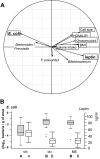Differential adaptation of human gut microbiota to bariatric surgery-induced weight loss: links with metabolic and low-grade inflammation markers
- PMID: 20876719
- PMCID: PMC2992765
- DOI: 10.2337/db10-0253
Differential adaptation of human gut microbiota to bariatric surgery-induced weight loss: links with metabolic and low-grade inflammation markers
Abstract
Objective: Obesity alters gut microbiota ecology and associates with low-grade inflammation in humans. Roux-en-Y gastric bypass (RYGB) surgery is one of the most efficient procedures for the treatment of morbid obesity resulting in drastic weight loss and improvement of metabolic and inflammatory status. We analyzed the impact of RYGB on the modifications of gut microbiota and examined links with adaptations associated with this procedure.
Research design and methods: Gut microbiota was profiled from fecal samples by real-time quantitative PCR in 13 lean control subjects and in 30 obese individuals (with seven type 2 diabetics) explored before (M0), 3 months (M3), and 6 months (M6) after RYGB.
Results: Four major findings are highlighted: 1) Bacteroides/Prevotella group was lower in obese subjects than in control subjects at M0 and increased at M3. It was negatively correlated with corpulence, but the correlation depended highly on caloric intake; 2) Escherichia coli species increased at M3 and inversely correlated with fat mass and leptin levels independently of changes in food intake; 3) lactic acid bacteria including Lactobacillus/Leuconostoc/Pediococcus group and Bifidobacterium genus decreased at M3; and 4) Faecalibacterium prausnitzii species was lower in subjects with diabetes and associated negatively with inflammatory markers at M0 and throughout the follow-up after surgery independently of changes in food intake.
Conclusions: These results suggest that components of the dominant gut microbiota rapidly adapt in a starvation-like situation induced by RYGB while the F. prausnitzii species is directly linked to the reduction in low-grade inflammation state in obesity and diabetes independently of calorie intake.
Figures


References
-
- Clement K, Langin D: Regulation of inflammation-related genes in human adipose tissue. J Intern Med 2007;262:422–430 - PubMed
-
- Pradhan A: Obesity, metabolic syndrome, and type 2 diabetes: inflammatory basis of glucose metabolic disorders. Nutr Rev 2007;65:S152–156 - PubMed
-
- DiBaise JK, Zhang H, Crowell MD, Krajmalnik-Brown R, Decker GA, Rittmann BE: Gut microbiota and its possible relationship with obesity. Mayo Clin Proc 2008;83:460–469 - PubMed
-
- Turnbaugh PJ, Ley RE, Mahowald MA, Magrini V, Mardis ER, Gordon JI: An obesity-associated gut microbiome with increased capacity for energy harvest. Nature 2006;444:1027–1131 - PubMed
Publication types
MeSH terms
Substances
LinkOut - more resources
Full Text Sources
Other Literature Sources
Medical
Research Materials

